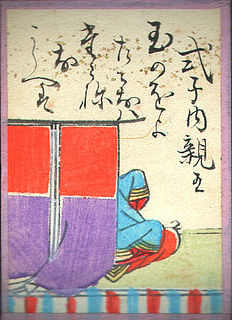A Quote by Samuel Taylor Coleridge
The intelligible forms of ancient poets, The fair humanities of old religion, The power, the beauty, and the majesty That had their haunts in dale or piny mountain, Or forest by slow stream, or pebbly spring, Or chasms and watery depths, all these have vanished; They live no longer in the faith of reason.
Related Quotes
And the true order of going, or being led by another, to the things of love, is to begin from the beauties of earth and mount upwards for the sake of that other beauty, using these steps only, and from one going on to two, and from two to all fair forms to fair practices, and from fair practices to fair notions, until from fair notions he arrives at the notion of absolute beauty, and at last knows what the essence of beauty is.
Political organizations have slowly substituted themselves for the Churches as the places of believing practices, but for this very reason, they seem to have been haunted by the return of a very ancient (preChristian) and very “pagan” alliance between power and religion. It is as though now that religion has ceased to be an autonomous power (the “power of religion,” people used to say), politics has once again become religious.
There are certainly times in history where power associates itself closely with fields that we would call the humanities, like rulers surrounding themselves with philosophers and poets, or playwrights. We do not live in that moment, and the best way to gauge the proximity of an academic field to power is by salary.
Those may justly be reckoned void of understanding that do not bless and praise God; nor do men ever rightly use their reason till they begin to be religious, nor live as men till they live to the glory of God. As reason is the substratum or subject of religion (so that creatures which have no reason are not capable of religion), so religion is the crown and glory of reason, and we have our reason in vain, and shall one day wish we had never had it, if we do not glorify God with it.
Where freedom of religion has been attacked, the attack has come from sources opposed to democracy. Where democracy has been overthrown, the spirit of free worship has disappeared. And where religion and democracy have vanished, good faith and reason in international affairs have given way to strident ambition and brute force.
No one has ever laughed at a pun who did not see in the one word a twofold meaning. To materialists this world is opaque like a curtain; nothing can be seen through it. A mountain is just a mountain, a sunset just a sunset; but to poets, artists, and saints, the world is transparent like a window pane - it tells of something beyond....a mountain tells of the Power of God, the sunset of His Beauty, and the snowflake of His Purity.
Religions, of course, have their own demanding intellectual traditions, as Jesuits and Talmudic scholars might attest.... But, in its less rigorous, popular forms, religion is about as intellectually challenging as the average self-help book. (Like personal development literature, mass market books about spirituality and religion celebrate emotionalism and denigrate reason. They elevate the "truths" of myths and parables over empiricism.) In its more authoritarian forms, religion punishes questioning and rewards gullibility. Faith is not a function of stupidity but a frequent cause of it.
Kant's aim was to develop a religion within the boundaries of mere reason (that is, reason unaided by special empirical revelation) and then to ask about existing ecclesiastical faith (especially about Christianity, and the Lutheran Christianity of his time and place) how this revealed faith must be interpreted if it is to be reconciled with reason, and even seen as a wider (though morally optional) extension of a religion of reason.







































